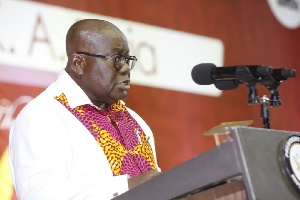President Nana Addo Danwka Akufo-Addo in reaction to allegations of corruption in his government by some foreign diplomats in Ghana, issued what was said to be a warning to the diplomats.
The President addressing members of the diplomatic corps at the Peduase Lodge in 2020 cautioned the diplomatic community against making “unspecified generalised pronouncements on corruption” in his government.
Read the full article as first published by the Herald newspaper below:
President Akufo-Addo has warned members of the diplomatic corps, against making “unspecified generalised pronouncements on corruption” in his government.
According to him, “Should you, members of the diplomatic corps, be notified of any evidence of corruption against any of my appointees, I insist that they should be shared with my office to enable action to be taken on the matter, than unspecified generalised pronouncements on corruption.”
Various diplomats in the American Ambassador, the UK High Commissioner and the Netherland, have in recent times expressed worry about the growing incidence of corruption in the country with one of them; the Australian High Commissioner to Ghana, asking the country to rather the declare Ghana behind Corruption, as opposed to Ghana Beyond Aid declared by President Akufo-Addo.
Some of these comments include criticisms from the members of the opposition National Democratic Congress (NDC) that President Akufo-Addo has become a “clearing agent” clearing his appointees accused of corruption, has not been well received by the President.
Addressing members of the diplomatic corps at a reception at the Peduase Lodge in the Eastern Region on Tuesday night [January 28, 2020], the President, claimed two executive appointees are still facing investigations. He, however, failed to give out their names, thus leaving additional doubts in their minds.
“Every single alleged act of corruption levelled against any of my appointees is being or has been investigated by independent bodies such as CHRAJ (Commission on Human Rights and Administrative Justice), CID (Criminal Investigations Department of Ghana Police) and in some cases by Parliament itself.”
“Indeed, two appointees of the executive are still facing investigations. It is refreshing to note that none of these [investigative] agencies have ever indicated any pressure from the executive over their investigation,” he said.
The President added: “Should you, members of the diplomatic corps be notified of any evidence of corruption against any of my appointees, I insist that they should be shared with my office to enable action to be taken on the matter,… than unspecified generalised pronouncements on corruption.”
He said the New Patriotic Party (NPP) government, has been accused, especially by the opposition National Democratic Congress (NDC) of clearing officials in his government involved in corruption scandals, instead of having them punished.
In December last year, The Herald published that more and more foreign envoys are beginning to speak against the corruption menace in the country under the Akufo-Addo government and warning that efforts to attract more foreign direct investment into Ghana, may hit a snag due to corruption.
At a forum centered on fighting corruption organized by the Ghana Integrity Initiative (GII) consortium, the Ambassador of the Kingdom of the Netherlands and the British High Commissioner revealed that some investors remain skeptical of dealings in Ghana.
The U.S. Ambassador to Ghana, Stephanie Sullivan, also made a strong case for Ghana to take her corruption fight to levels, where people caught indulging in the practice face heavy sanctions, adding the high perception of corruption among state institutions, has the potential to affect the business confidence of investors.
The Ambassador of the Kingdom of Netherlands to Ghana, Ron Strikker, noted that anti-corruption efforts were just as important as promotion efforts by the Ghana Investment Promotion Centre (GIPC).
The Transparency International (TI) in January last year, ranked Ghana 78 out of 180 countries on the 2018 global Corruption Perception Index.
According to the report, Ghana scored 41 out of a possible clean score of 100, with the score showing that Ghana’s performance, had improved by one point from its 2017 score of 40.
While several factors, including policies and initiatives by the governing New Patriotic Party (NPP), have been alleged to account for this improvement, some Ghanaians, maintain the government is losing the fight on the ground.
Speaking at a public forum on the “Cost of corruption in Ghana – deliberations for remedy”, the US Ambassador urged authorities to crack the whip and punish corrupt persons to restore confidence in the system.
“Corruption is not a victimless crime, it actually involves stealing directly from people. Globally, corruption cost 5% of GDP, it increases the cost of doing business and reduces investment in countries perceived to be generally corrupt. Under the US Foreign Corrupt Practices Act, American companies are forbidden from engaging in bribery and corruption under penalty of our laws which are vigorously enforced.
“West Africa loses 1.95 billion US dollars each year in the illicit trading in fisheries and other marine resources alone. On top of that, illegal mining, logging and wildlife trafficking cause nations and citizens even more.
“As we discuss this in small groups following this encounter, we ask Ghanaians not to admire the problem but to deliberate on what is working well, what can be strengthened and how and what additional actionable measures can be put in place going forward.”
Backing the call by the U.S. Ambassador, the Dutch Ambassador to Ghana, Ron Strikker, advocated the use of investigative journalism as a key tool to unearthing corruption.
General News of Monday, 1 February 2021
Source: www.ghanaweb.com

















